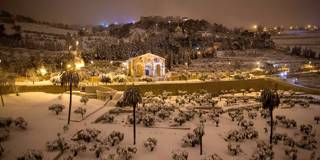Palestine is blessed with many special holy places, and the tourism they attract is a hugely important economic resource and vital instrument for preserving Palestinian culture. But unprecedented obstacles erected by Israel threaten Palestine's efforts to develop the sector.
BETHLEHEM – At this time of year, billions of people around the world turn their gaze to Palestine, the birthplace of Jesus Christ. Palestine is blessed with many holy places and relies heavily on religious tourism, not only as a source of economic and cultural capital, but also as an important part of its struggle for liberty and a vital instrument in preserving Palestinian culture and heritage. But, even though Palestine passed the three-million tourist mark in 2019, and that record is expected to be broken again this coming year, unprecedented obstructions, from Israeli settlement building to onerous travel restrictions, threaten to derail this progress.
Palestine’s religious landmarks attract increasing numbers of religious tourists from all over the world each year. In addition to Bethlehem’s Church of the Nativity, Palestine is home to the Church of the Holy Sepulcher and Al-Aqsa Mosque in Jerusalem, as well as the Ibrahimi Mosque in nearby Hebron.
Already, hotel reservations for 2020 signal even bigger numbers of tourists than we have seen before, which would be recognition of all the hard work that has been done in this crucial area. The government of Palestine has been taking steps to augment the traditional religious pilgrimages with new forms of tourism, including environmental and alternative tourism to marginalized areas, especially those communities threatened by Israel’s settlement program and the building of the wall in the West Bank. Palestinians in those frontline locations cherish the politically minded tourists who come to show support and solidarity.

BETHLEHEM – At this time of year, billions of people around the world turn their gaze to Palestine, the birthplace of Jesus Christ. Palestine is blessed with many holy places and relies heavily on religious tourism, not only as a source of economic and cultural capital, but also as an important part of its struggle for liberty and a vital instrument in preserving Palestinian culture and heritage. But, even though Palestine passed the three-million tourist mark in 2019, and that record is expected to be broken again this coming year, unprecedented obstructions, from Israeli settlement building to onerous travel restrictions, threaten to derail this progress.
Palestine’s religious landmarks attract increasing numbers of religious tourists from all over the world each year. In addition to Bethlehem’s Church of the Nativity, Palestine is home to the Church of the Holy Sepulcher and Al-Aqsa Mosque in Jerusalem, as well as the Ibrahimi Mosque in nearby Hebron.
Already, hotel reservations for 2020 signal even bigger numbers of tourists than we have seen before, which would be recognition of all the hard work that has been done in this crucial area. The government of Palestine has been taking steps to augment the traditional religious pilgrimages with new forms of tourism, including environmental and alternative tourism to marginalized areas, especially those communities threatened by Israel’s settlement program and the building of the wall in the West Bank. Palestinians in those frontline locations cherish the politically minded tourists who come to show support and solidarity.